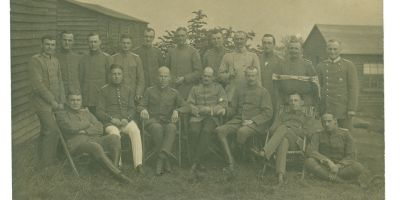‘Every Hand an Adventure’, Professor Emma Cayley presents her inaugural lecture

Professor Emma Cayley gives her inaugural lecture on medieval playing cards and manuscripts
On Thursday 11 May, Professor Emma Cayley gave her inaugural lecture, entitled ‘Every Hand an Adventure: Making Meaning in Medieval Manuscripts’ at the University of Leeds.
Professor Cayley is the Head of the School of Languages, Cultures and Societies, as well as Professor of Medieval French, at the University. Her areas of expertise include, but are not limited to, medieval French literature, particularly late-medieval poetry. She has published extensively in this field, including a monograph in 2006 on Alain Chartier and medieval debate poetry, titled Debate and Dialogue: Alain Chartier in his Cultural Context. Additionally, she is experienced in medieval manuscript studies, the history of the book, and digital humanities, which are all evidenced in this lecture.
After she thanked her family, friends, and colleagues, Professor Cayley started with an overview of medieval manuscripts and manuscript fragments, emphasising the themes of chance and choice, or serendipity and skill. She likened the survival of manuscripts, manuscript fragments, and playing cards to games. In games, chance determines the outcome as much as skill does, and in manuscript history, chance relates to the surviving material, while skills relates to the used and needed skills. She also directed the audience to her lecture's title, ‘Every Hand an Adventure', where every hand means the script, the text, the material; and where every adventure refers to the detective-like work of piecing the fragments back together to create a narrative.
Professor Cayley explained that for some manuscripts, survival came in the form of fragments, frequently used to strengthen the covers and spines of incunabula (early printed books). Even in our contemporary society, manuscripts are deliberately fragmented and sold as individual leaves.
From this, she moved on to discuss the history of play in the Middle Ages, including its depiction. She mentioned, for example, Alfonso X's thirteenth-century Libro de los juegos (‘Book of games'), which shows medieval people playing chess and cards. Professor Cayley further explained that the images of play, such as in the Libro, reflected medieval society. The same was true for the images on a pack of cards, whether palying cards or tarot cards.
Playing cards first came to the West from China, possibly in the fourteenth cenutry. They spread throughout Europe, and consequently their appearance depended on their place of production. Despite this, their presence and use was universal across regions as well as society. Whereas chess was seen, and depicted, as a game for society's higher classes, cards could be played by anyone.
But cards did not only survive as objects of play, Professor Cayley explained. They additionally were used to strengthen bindings, as material to secure charters, as models for manuscript illumination, and reused for moinaie de carte (cards as money).
Following on from her last point, for the final section of the lecture, Profesor Cayley returned to the topic of manuscript survival and fragmentoloy. As she stated earlier, manuscripts survive in various forms, such as full manuscripts and fragments, but besides their objectual survival, manuscripts display ownership and use. This includes animal traces, such as cat paw-prints, and human traces, such as annotations and traces of sweat.
The research into manuscripts, their fragments, and other materials such as cards is a long-standing practice. However, Professor Cayley advocated for the importance of digital afterlives. She herself has been involved in the Ripon Cathedral Fragments project (presented on 4 February 2003) and the Digital Explorations Project (ongoing), which have both emphasised the importance of digital humanities in the preservation and study of history.
Professor Cayley concluded her lecture with an emphasis on the relationship between (playing) cards, chance, choice, and manuscripts.




